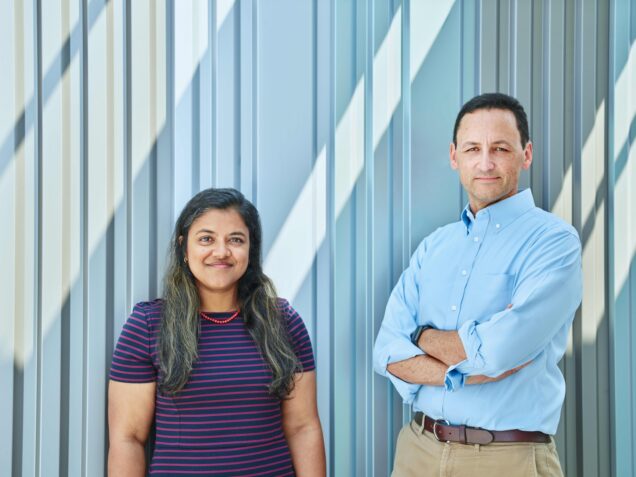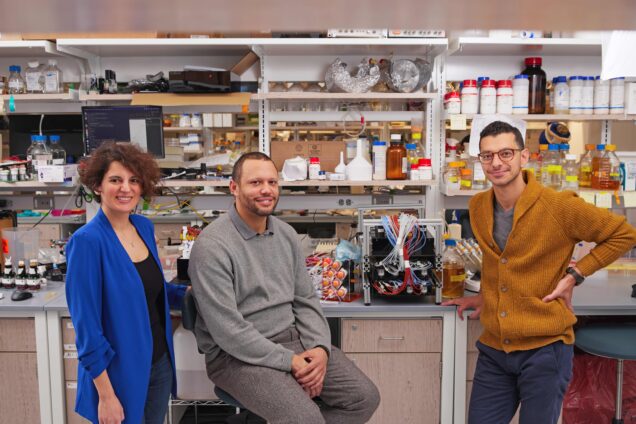Climate Warriors
WRAPPING ALL OUR ARMS AROUND THE PLANET
Combating climate change is a profound challenge, requiring a multipronged response from all corners of Boston University.
In FY2023, we added more prongs and more corners.
They include a joint venture to collect data around the impact of climate change on human health, an interdisciplinary engineering effort to scale up bioreactors, and global development policy that calls for greater cooperation with China, to name a few.
IS HUMAN HEALTH THE NEW POLAR BEAR?

Extreme weather events aren’t just resulting in more property damage and compromised animal habitats; they’re threatening the health of people around the world. Extreme heat, for example, poses a significant risk to our physical and mental health, leading to more deaths, hospitalizations, and emergency room visits during hot weather, says AMRUTA NORI-SARMA, an assistant professor of environmental health. People in vulnerable areas—such as low-income neighborhoods with fewer community resources or places less likely to have air-conditioning—are particularly at risk, she adds.
Nori-Sarma is coleading a unique joint venture with GREGORY WELLENIUS, a professor of environmental health at BU’s School of Public Health, and Harvard’s T.H. Chan School of Public Health. Backed by $6.7 MILLION in federal funding, they aim to confront the massive health threats posed by climate change through global research cooperation and the development of action plans. The three-year grant from the NATIONAL INSTITUTE OF ENVIRONMENTAL HEALTH SCIENCES, part of the NATIONAL INSTITUTES OF HEALTH, will launch the BUSPH-HSPH CAFÉ RESEARCH COORDINATING CENTER. Several faculty members from BU’s SPH and the Department of Earth & Environment are providing their support and expertise as well.
APPLE CORE POWER

Can apple cores, orange peelings, and rotten cabbage dramatically cut carbon emissions nationwide? At the College of Engineering, a cross-disciplinary trio of researchers is setting out to prove that they can.
RABIA YAZICIGIL, DOUGLAS DENSMORE, and AHMAD (MO) KHALIL are collaborating with experts from Capra Biosciences, Inc., developers of a cutting-edge bioreactor technology. The nutrients produced by decaying food, manure, and other waste products can help fuel bioreactors, which, in turn, can synthesize new substances. The result is everything from medicines and gene therapies to cleaner and greener materials, machine oils, detergents, fuels, fabrics, fragrances, and even foods.
However, refining and replicating the company’s innovative platform on a grand scale requires automation and novel quality-control and security measures. That’s where the BU team—with backgrounds in genetic engineering, electronics, and automation—comes in. As part of a federal push for more and better bioreactors, the team received a $3 million grant from Schmidt Futures, funding given in partnership with bioindustrial manufacturing consortium BioMADE. They also plan to share the technology they’re already developing with researchers worldwide.
“BLUE-ING” CHINA’S BELT AND ROAD INITIATIVE
Researchers at our GLOBAL DEVELOPMENT POLICY CENTER led the first comprehensive evaluation of the effects on marine ecosystems—and the communities who depend on them—from China’s Belt and Road Initiative (BRI), a global infrastructure development strategy.
An international team from Boston University; the University of Queensland; University of California, Santa Barbara; and Colorado State University quantified the social and environmental risks of 114 coastal development projects that China financed from 2008 to 2019. Among other findings, researchers determined that ports present the greatest impact risks to marine systems, with power plants, roads, and other facilities presenting relatively high localized risks. Their analysis was published in December 2022 in One Earth.
The researchers argue that an agenda is needed for “blue-ing” the BRI—one with stronger social and environmental safeguards, stricter standards for impact assessments, and management that includes local and indigenous communities.
